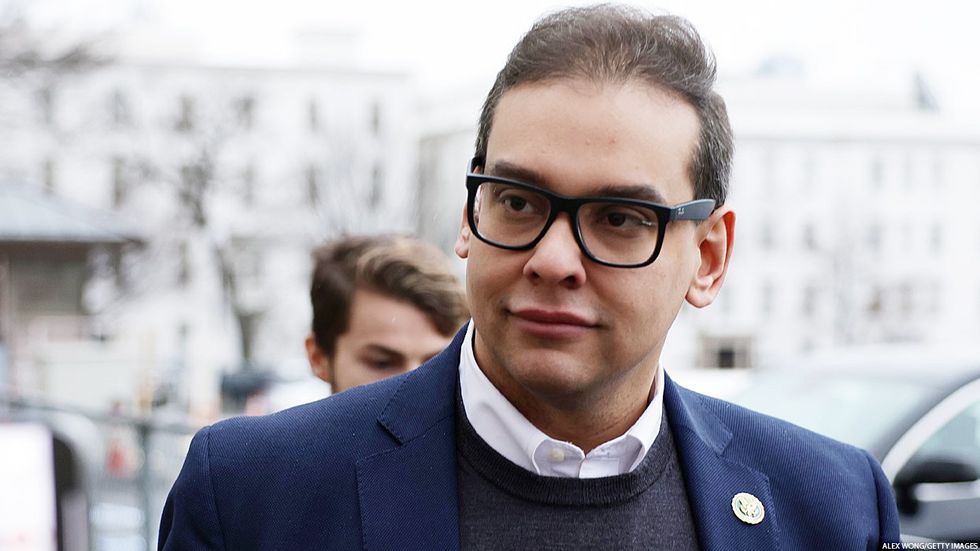For gay Republican U.S. Rep. George Santos, the hits keep on coming — after being caught in numerous lies and being indicted on federal fraud charges, he’s being accused of using his political connections in efforts to enrich himself.
The New York Times details several “instances of Mr. Santos blurring his political and business interests” in a story published Wednesday.
One of the examples is a firm called Red Strategies, a political consulting business founded by Santos, longtime associate Nancy Marks, and colleagues from Harbor City Capital, a Florida investment company where Santos had worked. Harbor City had closed after being accused of running a Ponzi scheme, an arrangement that pays off investors with funds from other investors.
So Santos, his Harbor City coworkers, and Marks started Red Strategies, and Santos quickly marketed the firm to far-right New York politician Tina Forte in 2021 and urged her to run for Congress against Democrat Alexandria Ocasio-Cortez, the Times reports. But he didn’t disclose that he was part of Red Strategies or that he knew the former Harbor City officials; he appeared to simply be making a friendly recommendation, Jen Remauro, then Forte’s campaign manager, told the Times. In a video call, he acted as though he was meeting the Harbor City alums for the first time, she said.
“George introduced himself to them and he was like, ‘pleased to meet you, blah, blah, blah,’” Remauro said, adding, “Meanwhile, fast forward, they all worked at that company that went under!”
The contract stated that Red Strategies could keep 80 percent of the funds it raised for Forte, but even the remaining 20 percent was often eaten up by expenses Red Strategies charged against the amount raised, including credit card processing fees that were much higher than normal, according to the Times. Santos’s lawyer, Joseph Murray, blamed Marks for any financial irregularities and said Santos regretted working with her. Marks did not comment to the Times, and Red Strategies is no longer in business.
In another instance, Santos and three associates approached one of his campaign donors and asked the donor to establish a limited liability company to help a Polish investor buy cryptocurrency. The Polish man couldn’t buy it directly because his bank account was frozen, they said. The donor, whose name was not disclosed in the Times article, was skeptical,
“While they hadn’t yet asked for money, he was struck by how much their pitch resembled the classic Nigerian prince email scheme, in which a rich, potentially fictitious, foreigner asks an outsider to help free up frozen assets,” the Times reports. The deal ultimately fell apart because the donor asked for changes in a nondisclosure agreement Santos and his partners wanted him to sign. Murray told the Times that Santos’s role was limited to making introductions.
The Times also mentions an instance that has been documented in the federal government’s charges against Santos. In 2022, he asked two donors, Raymond Tantillo and Andrew Intrater, for additional money for advertising, not subject to usual campaign finance limits because it was going through a nonprofit organization. They each contributed $25,000, according to federal prosecutors, who “say that rather than using the money for ads, Mr. Santos spent it on credit card payments and designer clothes,” the Times reports.
Santos has pleaded not guilty to all the federal charges he faces, which include felonies such as wire fraud and collecting unemployment benefits he wasn’t entitled to, in addition to the campaign finance incident involving Tantillo and Intrater.
Santos first ran for the U.S. House in 2020, unsuccessfully, but he was elected in 2022, representing a district on New York’s Long Island. There have been calls for him to resign along with attempts to expel or censure him, but so far he remains in Congress and says he’ll run for reelection in 2024. He has been caught in or admitted to lies about his education, employment, and ethnic background. He has falsely claimed that he had employees who died in the 2016 Pulse nightclub mass shooting, that his mother died as a result of the September 11 terrorist attacks, and that his grandparents were refugees from the Holocaust.



















































































